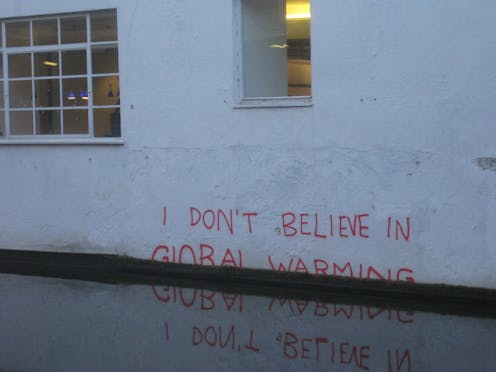Don't be afraid to talk about the costs of dealing with climate change
- Written by Brian Greenhill, Associate Professor of Political Science, University at Albany, State University of New York

Climate advocates[1] have struggled to persuade half of the U.S. public[2] of the need to do more to slow the pace of global warming.
But even as climate scientists are sounding louder and louder alarms about the urgency of the situation[3], they disagree among themselves about how to proceed.
As political scientists[4] who study the politics[5] of climate change[6], we wanted to find out how to get more people to take the risks of global warming seriously. So we designed an experiment.
Two approaches
Dealing with climate change requires two kinds of policies. One involves attempts to slow down the rate of global warming. This approach, which experts call “mitigation[7],” takes aim at what’s causing the problem by reducing the amount of carbon dioxide and other greenhouse gases accumulating in the atmosphere.
So far, most of these efforts have consisted of governments agreeing to take steps to reduce their carbon footprints, through accords like the Paris Agreement[8], which the U.S. government is leaving, and incentives at the state level[9] that encourage the use of solar and wind power.
The second approach seeks to manage the consequences of climate change that are already happening. Often called “adaptation[10],” it acknowledges that the world has waited too long[11] to prevent the problem. Since climate change[12] is already raising sea levels and making severe storms and other major weather events more deadly, humanity is already coping with the consequences.
A good example of adaptation policies is how Miami is spending an estimated US$400-500 million to elevate frequently flooded streets and roads[13] and take other steps to cope with rising sea levels[14].
Both approaches may sound essential, but some environmentalists worry[15] that drawing attention to the need to adjust to a changing climate will undercut public support to boost spending on efforts to slow the pace of global warming.
Actor Jack Black tours Florida neighborhoods that are often flooded due to rising sea levels in the National Geographic TV show ‘Years of Living Dangerously.’Higher gas taxes
We conducted an online survey to assess the validity of those concerns.
In this experiment, 2,000 people read different versions of the same brief newspaper-style article, which we wrote, discussing a proposal for a higher gasoline tax. The text explained that gas taxes can reduce carbon dioxide emissions, helping address the long-term problem of climate change.
At the same time, the article mentioned some short-term costs of letting global warming keep its current pace.
For example, scientists predict that droughts and floods[16] will become more frequent and intense, disrupting farming and eventually making food more expensive[17]. Similarly, the U.S. government foresees that more frequent extreme weather events will increase energy consumption and disrupt electricity grids[18], leading to higher power bills[19].
The different versions mentioned different kinds of adaptation costs and cited different price tags for those measures.
One group read that without stronger efforts, more frequent bouts of extreme weather would be likely to strain an already overstretched grid and make utility bills rise. Another group heard a specific estimate of $500 per year for the increased electricity costs. A third group heard that food prices and power costs would both go up.
A control group of people taking the survey received no information about likely adaptation costs. They were simply told that failing to do enough to slow the pace of climate change could bring on an “environmental catastrophe.” All four groups answered the same question about their willingness to payer higher gas taxes.
The results, published in the journal Environmental Communication[20], suggest that some of the concerns surrounding the discussion of adaptation costs are unfounded.
Rather than eroding support for a gas tax hike, we found that mentioning the costs of dealing with the consequences of global warming modestly increased support. This effect was more pronounced when we provided a more concrete estimate of the adaptation costs involved: a $500 estimated increase in annual household electric bills.
Of course, Americans have other reasons to either support or oppose increases for gas taxes, which raise money for highway construction and repairs[21]. But we believe that randomly assigning participants to the four groups ensured that any differences between their responses can be attributed to distinct approaches to climate change framing.
We also believe our results have important implications for how to effectively communicate about climate change. Instead of avoiding discussions about the cost of dealing with its effects today, our research indicates, policymakers and environmental activists should openly engage the public in those conversations.
References
- ^ Climate advocates (www.pbs.org)
- ^ persuade half of the U.S. public (news.gallup.com)
- ^ urgency of the situation (www.vox.com)
- ^ political scientists (scholar.google.com)
- ^ who study the politics (scholar.google.com)
- ^ climate change (scholar.google.com)
- ^ mitigation (www.bbc.com)
- ^ Paris Agreement (theconversation.com)
- ^ incentives at the state level (www.huffingtonpost.com)
- ^ adaptation (www.theguardian.com)
- ^ world has waited too long (theconversation.com)
- ^ climate change (climate.nasa.gov)
- ^ elevate frequently flooded streets and roads (www.npr.org)
- ^ rising sea levels (doi.org)
- ^ some environmentalists worry (e360.yale.edu)
- ^ droughts and floods (www.theguardian.com)
- ^ making food more expensive (foodtank.com)
- ^ increase energy consumption and disrupt electricity grids (19january2017snapshot.epa.gov)
- ^ higher power bills (psmag.com)
- ^ Environmental Communication (doi.org)
- ^ raise money for highway construction and repairs (theconversation.com)
Authors: Brian Greenhill, Associate Professor of Political Science, University at Albany, State University of New York

